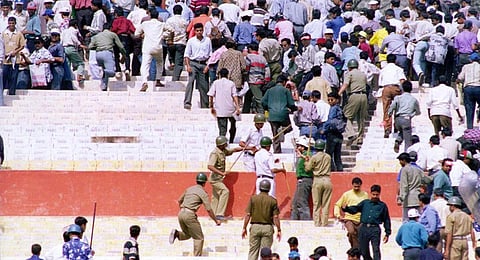

KOLKATA: Soon after the much-anticipated India-Pakistan clash at the ongoing World Cup, the Pakistan Cricket Board filed a formal complaint to the ICC alleging inappropriate behaviour from the Ahmedabad crowd towards its players. Pakistan skipper Babar Azam was allegedly booed at the toss and later, wicketkeeper-batter Mohammad Rizwan was reportedly taunted with the chant of 'Jai Shri Ram' while walking back to the pavilion. In the post-match press conference, Pakistan's team director Mickey Arthur said that the game felt more like a BCCI event than an ICC one, citing the absence of Pakistan fans.
There are numerous instances when such troubles, sometimes violent as well, affected the matches with some of them postponed or even abandoned. Spectators in Ahmedabad might have escaped unharmed but not all managed to walk away scot-free irrespective of their involvement in the incident.
One such incident, which even found a place in the legendary Pakistan pacer Wasim Akram's memoir — Sultan, happened at Eden Gardens in Kolkata with arch-rivals India and Pakistan playing the first match of the Asian Tests Championship in February 1999.
Even as emotions ran high, the match kept swinging in the two teams' favour across four days. However, Sachin Tendulkar's unfortunate run out after he collided with Pakistan pacer Shoaib Akhtar on the penultimate day infuriated the spectators, who started pelting bottles and other objects at the bowler as he returned to his fielding position in the deep. Tendulkar's appeal might have pacified the crowd but all hell broke loose within 30 minutes of the play on the last day, prompting the police to forcibly vacate the ground filled with thousands of people.
The then police commissioner of Kolkata, Dinesh Vajpai, still remembers the day. "Naturally, the public was angry after Tendulkar's dismissal in the second innings. They somehow were pacified that day as their hero, Tendulkar, made an appeal to them but on the fifth day, they went on a rampage as India were on the verge of loss," Vajpai, who retired as the DGP of West Bengal in 2004, told this daily.
The top cop even ran for the post of president of the Cricket Association of Bengal (CAB) the next year but was defeated convincingly by Jagmohan Dalmiya. Recalling the 1999 incident, the IPS officer from the 1966 batch said, "Construction work was going on at the venue with debris lying all over. We have been telling the cricket authorities of Bengal to repair the stadium as it was in bad shape. We feared it may happen and even wrote to the CAB and state government but to no avail. Crowd trouble marred the match twice before the violence on the last day. It is always difficult to control such a huge crowd especially with their team certain to lose the match."
When Vajpai pronounced his decision to remove the spectators from the ground, police deployed at the venue were skeptical as they believed the task was almost impossible. "I asked the cops to first vacate people seated near the exit gates. Had we started removing people randomly that would have led to a stampede. Once the exit gates were vacated, we started removing other spectators. A few agreed to leave the venue while others were forcibly removed but we never resorted to lathi charge as that too would have caused panic leading to the stampede. We managed to vacate the stadium filled with around 65,000 people in 15-20 minutes with the help of a little over 2,000 police personnel, a section of whom were deployed outside the stadium," said 79-year-old Vajpai, who was stationed in the ground and was in constant touch with cops over the walkie-talkie.
Even as the former top cop claimed police didn't resort to cane charging, journalists and others who were present at the venue on that fateful day believed otherwise. "I was covering that match and saw people injured. Police resorted to lathi charge as far as I know," a journalist told this daily.
Incidentally, Vajpai also witnessed the ill-fated 1996 World Cup semifinal between India and Sri Lanka which had to be abandoned as the crowd turned violent. "I was there at the venue as an additional commissioner of police. Three years later, I was commissioner of police when India played Pakistan in the Test. At that time, the match referee told me specifically that if the agitators were not controlled then the match could be abandoned like 1996 and this could lead to disqualification of Kolkata for future matches. How could we allow that so we decided to vacate the stadium."
A passionate golfer swinging the club at Tollygunge Club these days, 79-year-old Vajpai is unlikely to visit the venue for the World Cup matches. "I now find watching the games at home more comfortable," signed off Vajpai.
Who knows, the two unsavoury incidents might be one of the reasons for the retired top cop to stay home even as citizens from the City of Joy, where he once was in charge of maintaining law and order, turned in huge numbers to watch their favourite stars in action on Sunday.